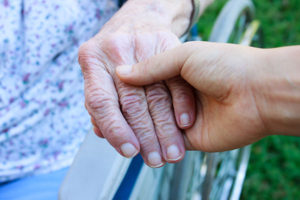 Older adults’ mental health needs are often missed or misdiagnosed. Improving knowledge and services is essential and must be addressed from the top down and the bottom up to include professionals and the lay public, according to mental health experts at a session during this spring’s American Society on Aging conference. The workshop provided insight into an ambitious program that helps people recognize and respond to mental health emergencies and seniors in emotional distress.
Older adults’ mental health needs are often missed or misdiagnosed. Improving knowledge and services is essential and must be addressed from the top down and the bottom up to include professionals and the lay public, according to mental health experts at a session during this spring’s American Society on Aging conference. The workshop provided insight into an ambitious program that helps people recognize and respond to mental health emergencies and seniors in emotional distress.
The statistics are sobering. In New York State, as many as 60% of older adults are estimated to be heavy drinkers. The misuse of prescription drugs is also a significant concern with in the state. Older adults use prescription drugs nearly three times as often as the general population, according to Tobi Abramson, Ph.D., director of geriatric mental health for New York City’s Department for the Aging.
The state’s public and mental health system is looking at how to prepare and address the unmet needs of older adults around mental health, around substance use, and around aging services. “The most common mental health disorders that we’re seeing among older adults are anxiety and major depression, that’s pretty consistent with the national picture. And they’re finding that those who are suffering from anxiety and depression, also contributes to severe isolation and inactivity and high suicide rates,” she said.
One effort to address these challenges, which are made worse by stigma and denial, is Mental Health First Aid. It’s a training program designed to expand community outreach and help more lay people recognize signs of possible mental health issues. This eight-hour course provides attendees the skills to help someone who is developing a mental health problem or experiencing a mental health crisis.
In addition to the course on older adults, the program offers courses focused on other groups, including teens and veterans, addressing topics such as higher education and public safety. In New York City, the training is available for free, as part of the City’s ThriveNYC Initiative. (We previously reported on New York City First Lady Chirlane McCrays Thrive NYC initiative).
Among the topics covered: depression and mood disorders; anxiety disorders; trauma, psychosis; and substance use disorders. Trainees are taught how to apply a five-step action plan in a variety of situations— helping someone through a panic attack, engaging with someone who may be suicidal or depressed. Strategies fall under the umbrella acronym ALGEE – assess for risk of suicide or harm; listen nonjudgmentally, give reassurance and information, encourage appropriate professional help, encourage self-help and other support strategies.
Participants are introduced to risk factors and warning signs for mental health or substance use problems, engage in role playing activities that build understanding of the impact of illness on individuals and families, and learn about evidence-supported treatment and self-help strategies.
About 20% of older adults throughout the country indicate that they have been diagnosed as having a mental health disorder, according to Abramson. “There’s this huge unmet need of mental health services. Difficulty accessing behavioral health services has a lot to do with the short supply of adequate staff, access to transportation, language, culture, there’s all sorts of reasons.”
The goal isn’t ever to teach somebody how to diagnose a mental health disorder, although we do talk about diagnosis and symptoms, Abramson said. The goal is to teach people to recognize the signs of a mental health disorder and what to do in the short term until you can get somebody connected to a professional or until that crisis has been resolved.
“It’s an opportunity for the lay public person to do something,” said Jacquelin Berman, Ph.D., director of research for New York City’s Department for the Aging.
Berman said people don’t make referrals for friends, neighbors, or community members for mental health services because they don’t always recognize it. If they do recognize it, then they don’t know what to do. “And so using a strategy like Mental Health First Aid gives people, something they can do, like CPR.”
Participants gain basic skills, knowing they will be able to at least ask the right questions and give reassurance and information, until they can connect the person with professional help: an emergency responder, a psychologist or psychiatrist, or a social worker. “It’s teaching people to listen in a nonjudgmental way,” Abramson said.
Mental Health First Aid was developed in Australia in 2001. It’s in use in 24 countries in addition to the U.S. and Australia, training over 2 million people worldwide.
Journalists may want to check with their city or state department of mental health about whether this program, or others are in use; what is being done to address the unmet mental health needs of our aging population and how are these services delivered, especially to those who are homebound, socially isolated or have issues with transportation, culture or language barriers?








